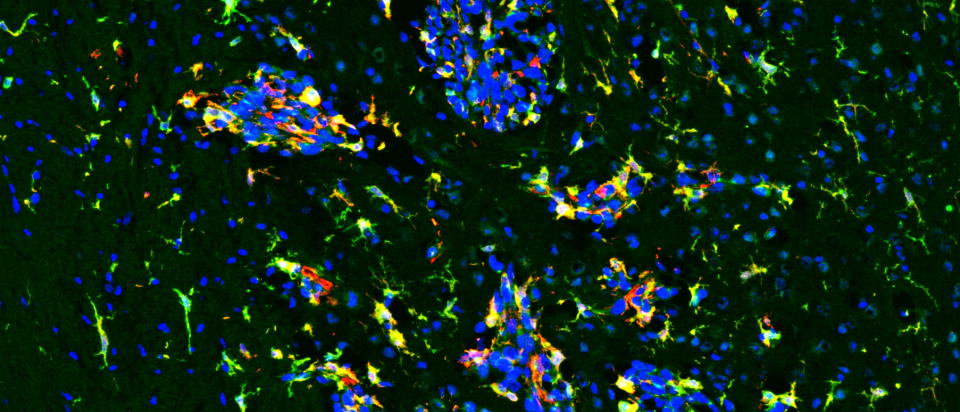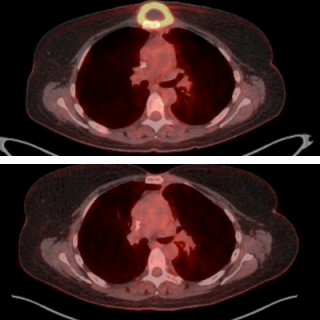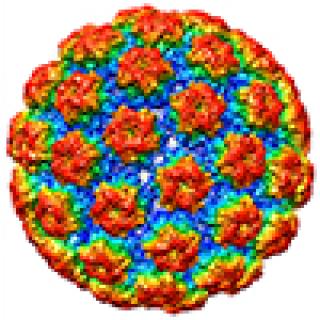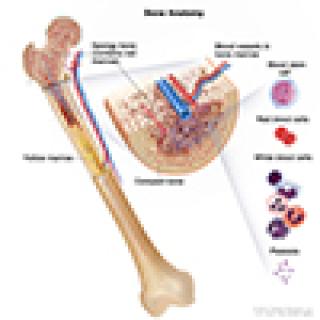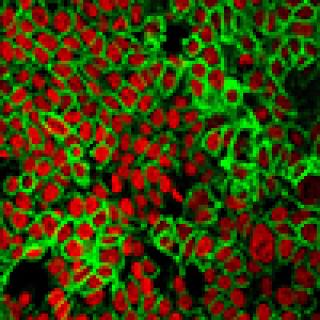News and Events
New Strategy Shows Promise Against Deadly Breast Cancer in the Brain
A new NIH study points to a promising strategy for treating aggressive breast cancer that spreads to the brain, a complication with few effective options. Learn how blocking a key brain cell survival pathway could open the door to future therapies.
Read MorePhase I CAR T-cell therapy leads to years-long remissions in relapsed B-cell lymphoma patients
In a Journal of Clinical Oncology article, results of a phase I trial by CCR investigators show that CAR T-cell therapy can result in long-lasting remissions in patients with certain relapsed B-cell lymphomas. Many who had life expectancies of only six months or less during the clinical trial of the therapy, which spanned from 2009 to 2015, remain in complete remission.
Read MoreClinical trial tests immunotherapy combination for advanced HPV-associated cancers
Human papillomavirus (HPV) is the most common sexually transmitted infection. More than 30,000 cases of HPV+ cancers occur every year in the United States. CCR investigators are leading a study using a combination of 3 immunotherapy drugs to treat HPV+ cancers.
Read MoreClinical trial tests vaccine for late-stage HPV-linked tumors
The human papillomavirus (HPV) has been linked to many kinds of cancer, including cervical, uterine, vaginal, penile and oropharyngeal. For those who develop advanced HPV-linked cancer, the NIH Clinical Center has a clinical trial open to test a vaccine with and without checkpoint inhibitors to see if this treatment approach can stop tumor growth.
Read MoreLymphoma therapy drug tested as early treatment for chronic graft-versus-host disease
cGvHD can occur after a person has had a stem cell or bone marrow transplant. In some cases, the donated bone marrow/stem cells view the host's body as foreign and start to attack it. cGvHD can occur at any time after a transplant, but it's more common after the marrow/stem cells have created a new immune system in the host's body. A clinical trial is studying the lymphoma therapy drug ibrutinib to see if early treatment can prevent the most severe symptoms of cGvHD.
Read MoreIra Pastan receives 2020 Paul A. Volcker Career Achievement award
Ira Pastan, M.D., NIH Distinguished Investigator and Co-Chief of the Laboratory of Molecular Biology, has received the 2020 Paul A. Volcker Career Achievement Medal from the Partnership for Public Service’ Service to America Medals, also known as the SAMMIES. The Paul A. Volcker Career Achievement Medal recognizes federal employees who have led significant and sustained achievements over 20 or more years of service in government. Dr. Pastan was recognized for discovering a new class of drugs that can successfully treat a rare form of leukemia and hold promise to be effective therapies for pancreatic and lung cancer as well as mesothelioma.
Read MoreRuth Nussinov and Kandice Tanner named American Physical Society Fellows
Ruth Nussinov, Ph.D., Senior Investigator in the Laboratory of Cancer Immunometabolism, and Kandice Tanner, Ph.D., Senior Investigator in the Laboratory of Cell Biology, were named as American Physical Society Fellows. The fellowship program recognizes members who made advances in physics through original research and publication or made significant innovative contributions in the application of physics to science and technology.
Read MoreJordan Meier receives the 2021 Eli Lilly Award in Biological Chemistry
Jordan Meier, Ph.D., Senior Investigator in the Chemical Biology Laboratory, received the 2021 Eli Lilly Award in Biological Chemistry for outstanding research of unusual merit and independence of thought and originality. Dr. Meier’s efforts in defining how metabolism regulates epigenetic signaling in cancer and how metabolite-protein interactions occur in all living organisms were cited as meritorious examples of advancing two fundamental areas of research.
Read MoreSue Wickner receives the 2021 American Society for Microbiology Award for Basic Research
Sue Wickner, Ph.D., Senior Investigator in the Laboratory of Molecular Biology, received the 2021 American Society for Microbiology Award for Basic Research. The award recognizes outstanding scientists whose discoveries have been fundamental to advancing our understanding of the microbial world. Dr. Wickner’s research into the mechanisms of action of molecular chaperones aims to provide insight for future development of drugs for the prevention and treatment of diseases caused by protein aggregation and misfolding, including Alzheimer's, Parkinson's, type II diabetes, cystic fibrosis, and prion diseases.
Read MoreCombination therapy for solid tumors and small-cell cancers studied in new clinical trial
A clinical trial of a drug combination to treat solid tumors and small-cell cancers is being conducted at the NIH Clinical Center. PARP inhibitors can work better when combined with chemotherapy, such combinations can be too toxic, so this study uses a new kind of chemotherapy called PLX038 and combines it with a PARP inhibitor rucaparib to see if the combination of PLX038 and rucaparib can safely shrink solid tumors and small-cell cancers.
Read MoreClinical trial studies combination immunotherapy for colorectal cancer
Colorectal cancer (CRC) affects the colon and rectum, which are located at the lower end of the digestive tract. One of the most common cancers, it often spreads to the liver. Because treatments that aim to use the patient’s own immune system to attack mCRC have not been very successful so far, investigators are leading a study that combines two different types of immunotherapy to see if one can enhance the effect of the other.
Read More